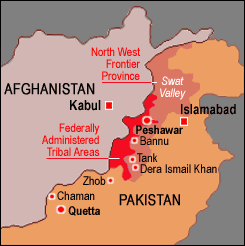 A leader of the Pakistani Taliban, based in South Waziristan, is mobilizing an estimated 3,000 men in an armed resistance to Al Qaeda and Tehreek-e-Taliban Pakistan (TTP), the groups responsible for the domestic attacks in Pakistan. Since the Koran prohibits Muslims from fighting Muslims, Islamic extremists targeting hospitals, mosques and civilians in Pakistan “is wrong, ” said Qari Zainuddin, the Taliban leader whose militia is prepared to battle Al Qaeda. For weeks, clashes between the Pakistani military and insurgents have destroyed local villages and wreaked havoc across the country while, according to Zainuddin, distracting the militants from the war with “infidels” in Afghanistan. The willingness of the Pakistani Taliban to fight Al Qaeda, a former ally, highlights a schism in Pakistan over the costs of extending the Afghan campaign into northwest Pakistan, and the viability of fighting a broader war against Western forces in the region.
A leader of the Pakistani Taliban, based in South Waziristan, is mobilizing an estimated 3,000 men in an armed resistance to Al Qaeda and Tehreek-e-Taliban Pakistan (TTP), the groups responsible for the domestic attacks in Pakistan. Since the Koran prohibits Muslims from fighting Muslims, Islamic extremists targeting hospitals, mosques and civilians in Pakistan “is wrong, ” said Qari Zainuddin, the Taliban leader whose militia is prepared to battle Al Qaeda. For weeks, clashes between the Pakistani military and insurgents have destroyed local villages and wreaked havoc across the country while, according to Zainuddin, distracting the militants from the war with “infidels” in Afghanistan. The willingness of the Pakistani Taliban to fight Al Qaeda, a former ally, highlights a schism in Pakistan over the costs of extending the Afghan campaign into northwest Pakistan, and the viability of fighting a broader war against Western forces in the region.
Despite plans to form a unified national government before next month’s presidential elections, Mauritanian political leaders have failed to agree on just how to organize the transitional coalition. The delays are causing new tension between General Mohamed Ould Abdel Aziz, the presidential candidate who led the junta against the nation’s first democratically-elected administration last summer, and opposition leader Messaoud Ould Boulkheir, the current speaker of the Mauritanian parliament. About a week ago, the two sides met in Senegal to broker a deal that set open elections for July 18 (Aziz had previously tried to set elections for early June in order to limit the opposition). In the meantime, the agreement stipulated that deposed president Sidi Ould Cheikh Abdallahi would take over responsibility of a power-sharing government. The disagreement comes mostly over the symbolism of such a move. Boulkheir and the opposition have called for Abdallahi to first resume the presidency, resign it, and then take over the new government. But Aziz feels such theatrics, though seemingly innocuous, would indicate that the junta had failed. Applauding the move back to democracy, the United States and the European Union said they would resume assistance to the transitional government.
Several hostages have been killed in northern Yemen after being abducted last week by suspected Houthi rebels. Three female bodies were found by shepherds early today in the mountainous Saada province in Yemen’s northwest. Hours later, a representative from the Yemeni security forces said that six remaining hostages were also killed. Both reports, however, have yet to be confirmed by the Yemeni government. The hostages—seven Germans, one Briton, and a South Korean—were hospital workers kidnapped during a picnic. While the Yemeni government has accused Houthi rebels of the kidnapping, a spokesperson for the rebel group said today that such allegations were “baseless” and that the kidnappings were “staged” by the government. The rebels are predominantly of the Zaydi-Shiite sect and have long complained that the government favors Salafi Sunnis (whose religious practice is most similar to that of Saudi Wahabis). The Houthi rebels have also expressed concern over increased Saudi interference in Yemeni affairs. These killings come less than a week after 24 medics were abducted in a northwestern province of Yemen and promptly released by Houthi captors. Rebels in Yemen—either Houthi, southern secessionist, or Al Qaeda related—commonly kidnap foreigners to gain leverage with the Sanaa-based central government. Al Qaeda insurgents are also possible culprits in the murders, believed to be in retaliation for the government’s arrest of the terrorist group’s top financier on Sunday.